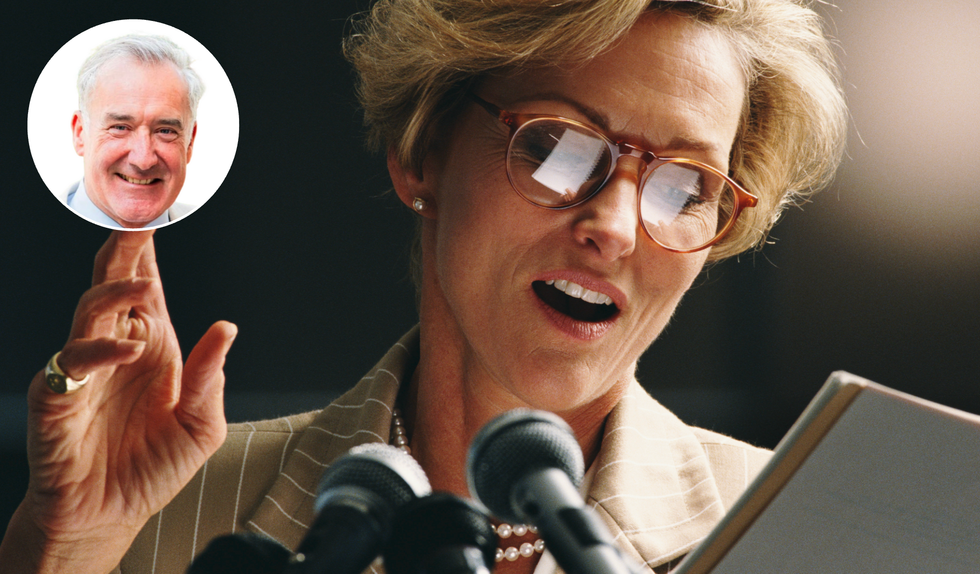‘The law disagrees with you and so does biology’: GB News star Martin Daubney left gobsmacked by doctor running trans care clinic
OPINION: Well, heroic is a stretch. But it’s not without stigma, writes Colin Brazier
Don't Miss
Most Read
Trending on GB News
Believe me when I say that, by the standards of TV, my ego is on the small side. But I’m not immune to flattery. If a member of the public recognises me (or, more commonly, confuses me with another former newsreader), I’m not above feeling a frisson of self-importance.
I can go months without it happening, or, as happened during a recent brief stay in hospital, it can happen repeatedly. The setting matters.
The people who did a double-take last week (“Don’t I know you from somewhere?”), were all non-native. Several hailed from Africa. Their common denominator: they’d all watched Sky News when I was a presenter there. And had presumably done so before moving to the UK, to improve their English language skills.
A few years ago, I talked to one such African migrant to the UK, who was working as a cloakroom attendant. His English was excellent and - to my point - spoken with a clarity and intelligibility often not to be found among people who were born here, regardless of ethnicity.
He told me how it had been a struggle when he moved to London, because the English spoken on England’s streets was very different from the English he’d learned in Africa from books.
It raises an interesting question, especially for those who like to see themselves as “inclusive”. Does the way many of us now speak English render the language inaccessible? This isn’t about pronunciation, regional accent or diction. It’s about enunciation. The way, for instance, we remember to add a ’t’ to the end of a word. It’s there on paper, but - with the spread of Estuary English - it often doesn’t make it into speech.
Was this what Keir Starmer had in mind a couple of years ago when he said he wanted schools to teach more ‘oracy’? Nope, I hadn’t heard of ‘oracy’ before either. It’s an ugly word to describe a beautiful thing. The ability to express oneself fluently and grammatically in speech.

Why must we tolerate gender-based fluidity but frown at the most heroic and subtle type? - Colin Brazier
Getty Images
I don’t often say this, but in this, Starmer was right. In a world where artificial intelligence can increasingly be used to make dumb people seem smart, the way we express ourselves verbally will come to matter more and more.
I remember doing a live TV interview at the height of the London riots in 2011. A producer had heroically found four gang members to talk about why they were smashing up shops and generally being obnoxious. At the end of the interview, I turned to my studio guest - the former Fleet Street editor Eve Pollard - who looked aghast. “Talking like that,” she said, “how will any of those young men ever get a job. They couldn’t even work in a sandwich shop”.
She was right. And so was Starmer. Speaking patois or a version of what linguists recently defined as multicultural London English is unlikely to be a catalyst for social mobility.
But let me take this a step further. This week, in the wake of the Supreme Court’s ruling on what a woman is, gender fluidity has been in the spotlight. But what about the one type of fluidity that increasingly dare not speak its name?
Before I seek to define it, let me recall some figures from British public life and ask what they all have in common. The historian David Starkey (originally from Cumbria). The broadcaster Joan Bakewell (originally from Stockport). The former Chancellor Ken Clarke (originally from Derbyshire). And the author of the BBC’s Letter From America, Alistair Cooke (originally from Salford). They all grew up in working-class families, went to grammar school or equivalent, and thence to Cambridge University.
At one point or another, all of them will have been denounced as class traitors for abandoning the thick speech patterns of their childhood. The Leeds-born playwright Alan Bennett talked about how, having ditched his flat vowels, he lived in fear at Oxford University of “being ambushed by the letter U”. The philosopher Roger Scruton, born into penury prior to grammar school and Cambridge, said that for those who choose to reinvent the way they present themselves to the world, facing down the snobbery that ensues can be the most heroic thing they ever do.
Well, heroic is a stretch. But it’s not without stigma. For my part, I do not speak in the same way I did in my youth. When challenged, I will mumble something about being "reprogrammed by the BBC". Having to speak more clearly as a newscaster. But the truth is that my verbal upgrades were not just a necessity born of broadcasting. They were aesthetic as much as anything else. I’m too young to belong to the Starkey/Scruton generation, who very deliberately changed the way they spoke, and were not above taking elocution lessons to achieve the desired result. For one thing, the accelerants for social advancement which allowed them to evolve are no longer there. Grammar schools were abolished, and national service was discontinued.
But I do defend the idea that, if someone wants to enunciate more clearly than hitherto was the case, then that is not a character flaw, nor an act of self-hatred. It seems odd to me that, when it comes to self-identification, our society will tolerate change to a degree unprecedented in human history (including the legal right to change gender), while continuing to frown on those who no longer talk as they once did.







